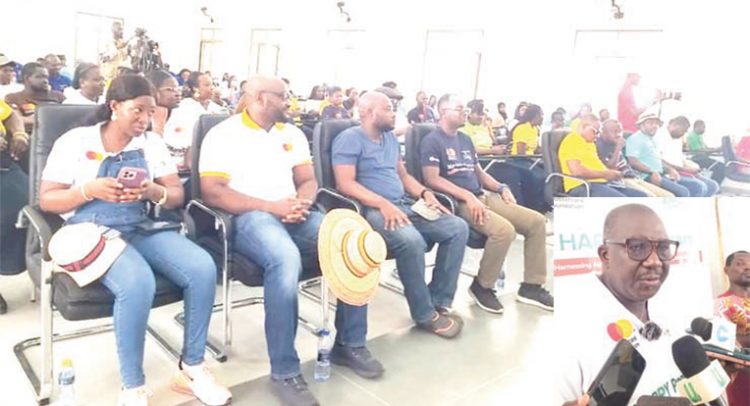HAPPY Projects participants, stakeholder partners in a group photograph. INSET: Daniel Fahene Acquaye
Founder and CEO, of Agri-Impact Group, Daniel Fahene Acquaye, has stated that following the launch of the Harnessing Agricultural Productivity and Prosperity for Youth (HAPPY), a total of 500, out of the estimated 826,000 jobs have been created for the youth in the areas of rice, poultry, soybean, and tomato.
This was initiated by the Mastercard Foundation in partnership with Agri-Impact Limited NewAge Agric Solutions, National Service Scheme (NSS), Ghana Cares (MiDA), Ghana Enterprises Agency (GEA), Ministry of Food and Agriculture (MOFA), TechnoServe, Catholic Relief Services (CRS) and Jobberman.
Mr. Fahene Acquaye added that the initiative seeks to reduce dependency on imports and foster local production, thereby generating employment opportunities for the youth.
He further noted that the programme not only targets job creation but also aims to produce 189,000 metric tons of food and generate approximately $200 million in annual income for participants.
“This initiative is expected to decrease Ghana’s food imports by 10%. The HAPPY Program specifically targets young people aged 15 to 35, with a commendable goal of including 70% women” he added.
Mr. Fahene Acquaye said this at the launch of a 10,000-acre irrigated rice field at Kasunya, being implemented by the Ministry of Finance in collaboration with the Ghana Irrigation Development Authority.
MiDA CEO, Michael Asare Bediako, said the collaboration began in December 2023 when MiDA signed a $6 million contract with Agri-impact to support working capital for 500 youth farmers cultivating 2,500 hectares of rice.
“This initiative has already created jobs for approximately 300 young individuals who are being accommodated and fed within the enclave.”
Mr. Bediako emphasized that the Kasunya Economic Enclave serves as a model under the Economic Enclaves Project of the Ghana CARES Obaatanpa Program, illustrating the power of public-private partnerships.
“To support these efforts, MiDA has invested in essential infrastructure, including roads, irrigation systems, electricity, accommodation facilities, a Multi-Purpose Training Centre, and a clinic. Additional housing units are under construction to accommodate staff and partners involved in the HAPPY Program,” he added.
BY Prince Fiifi Yorke


